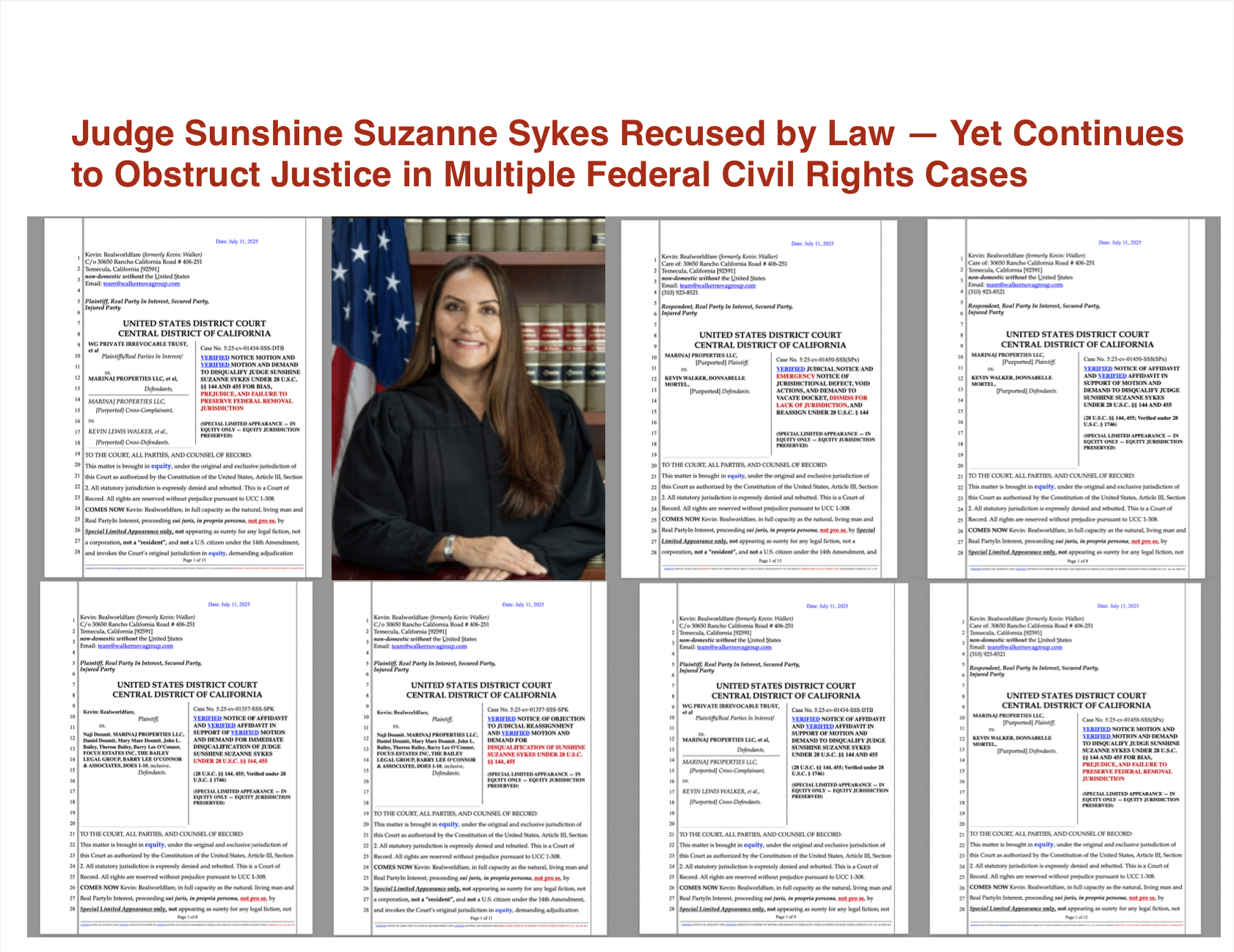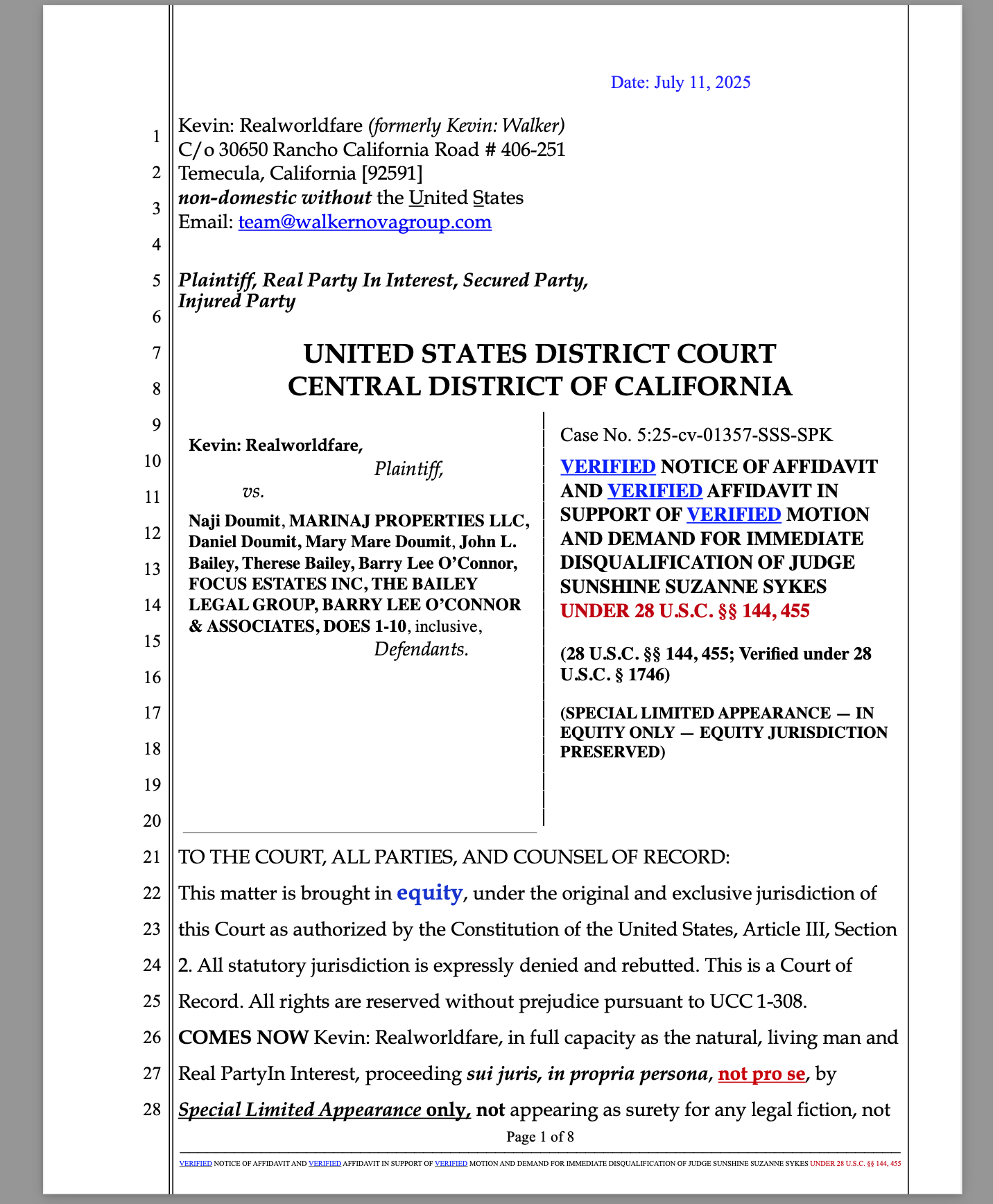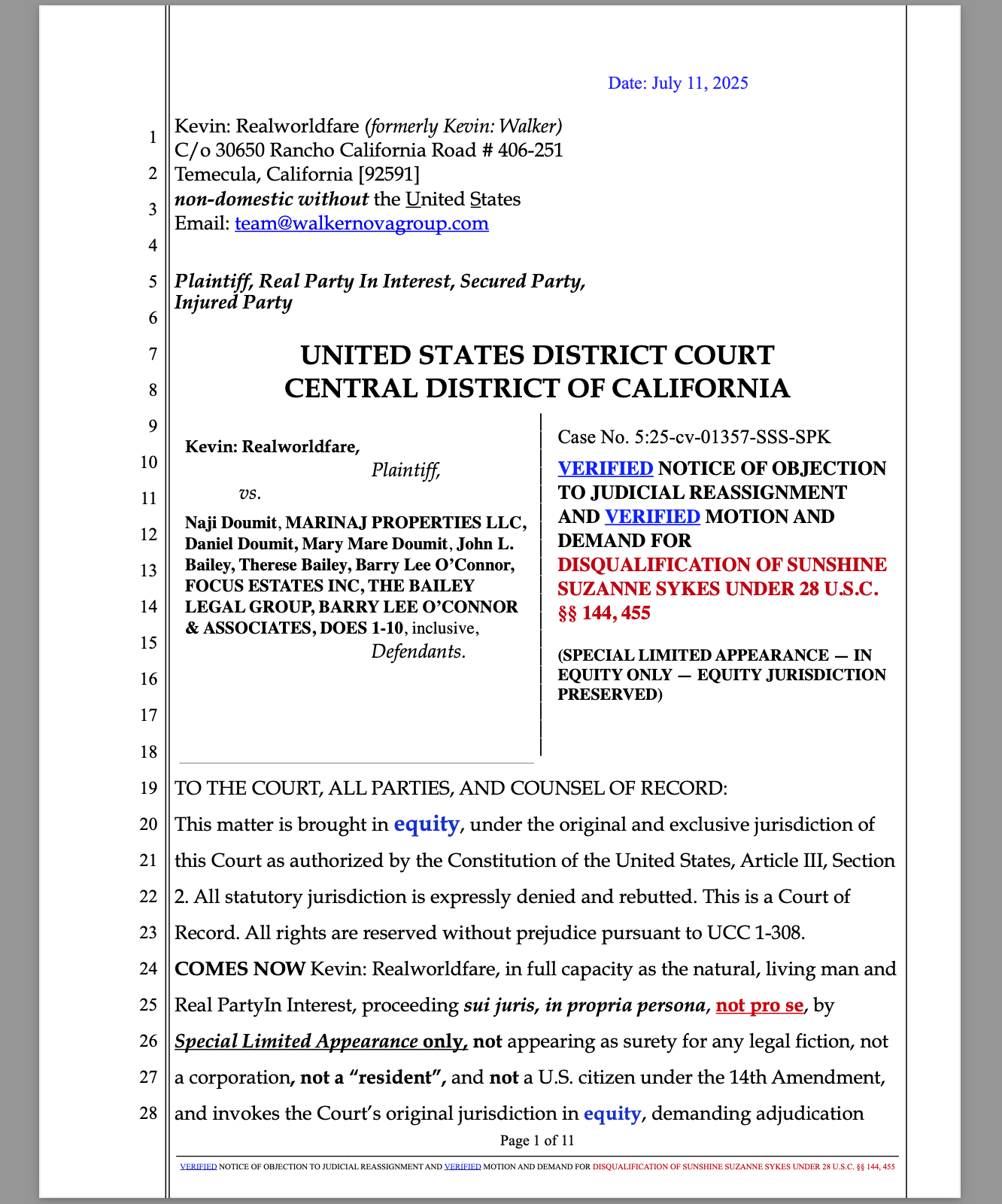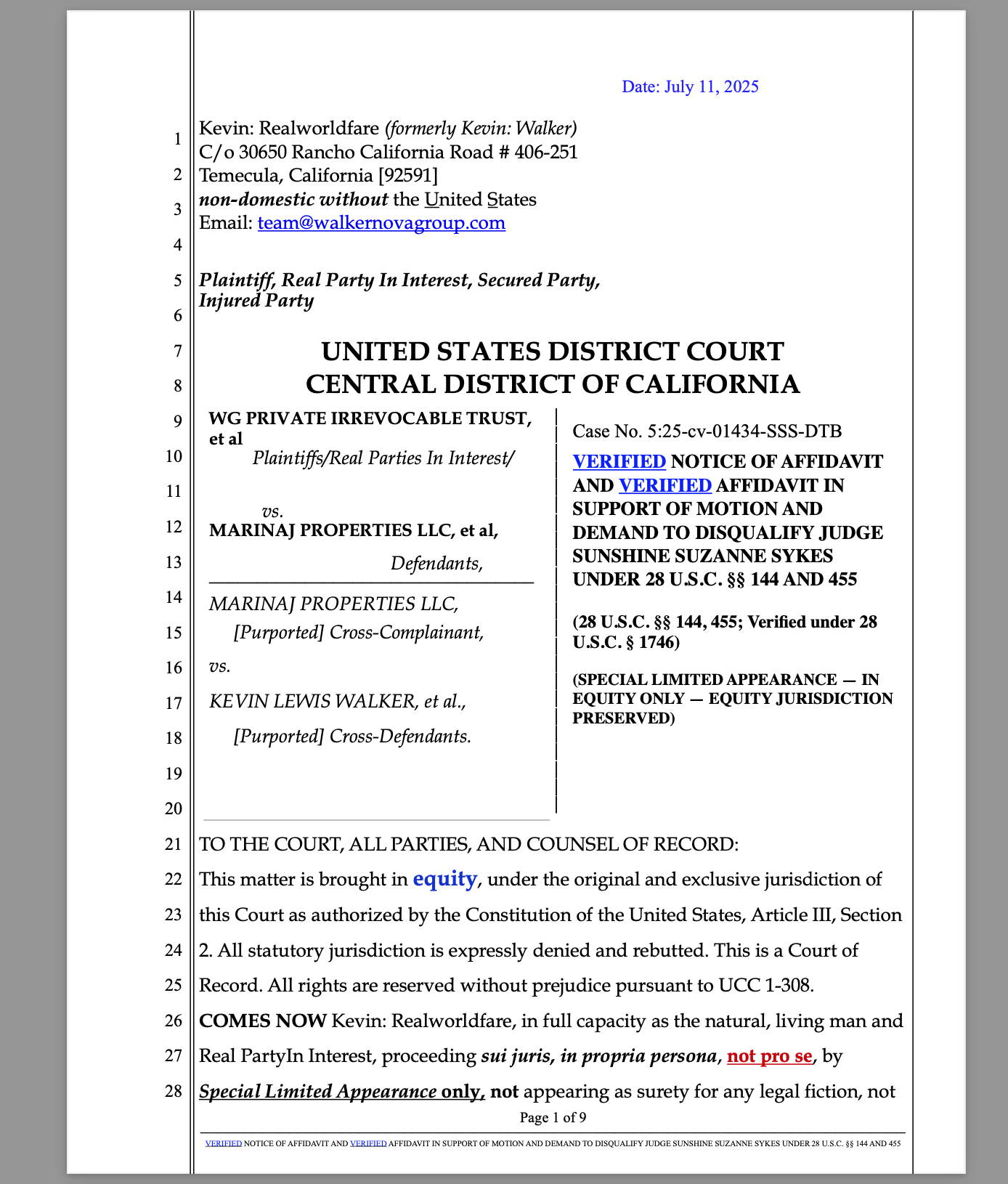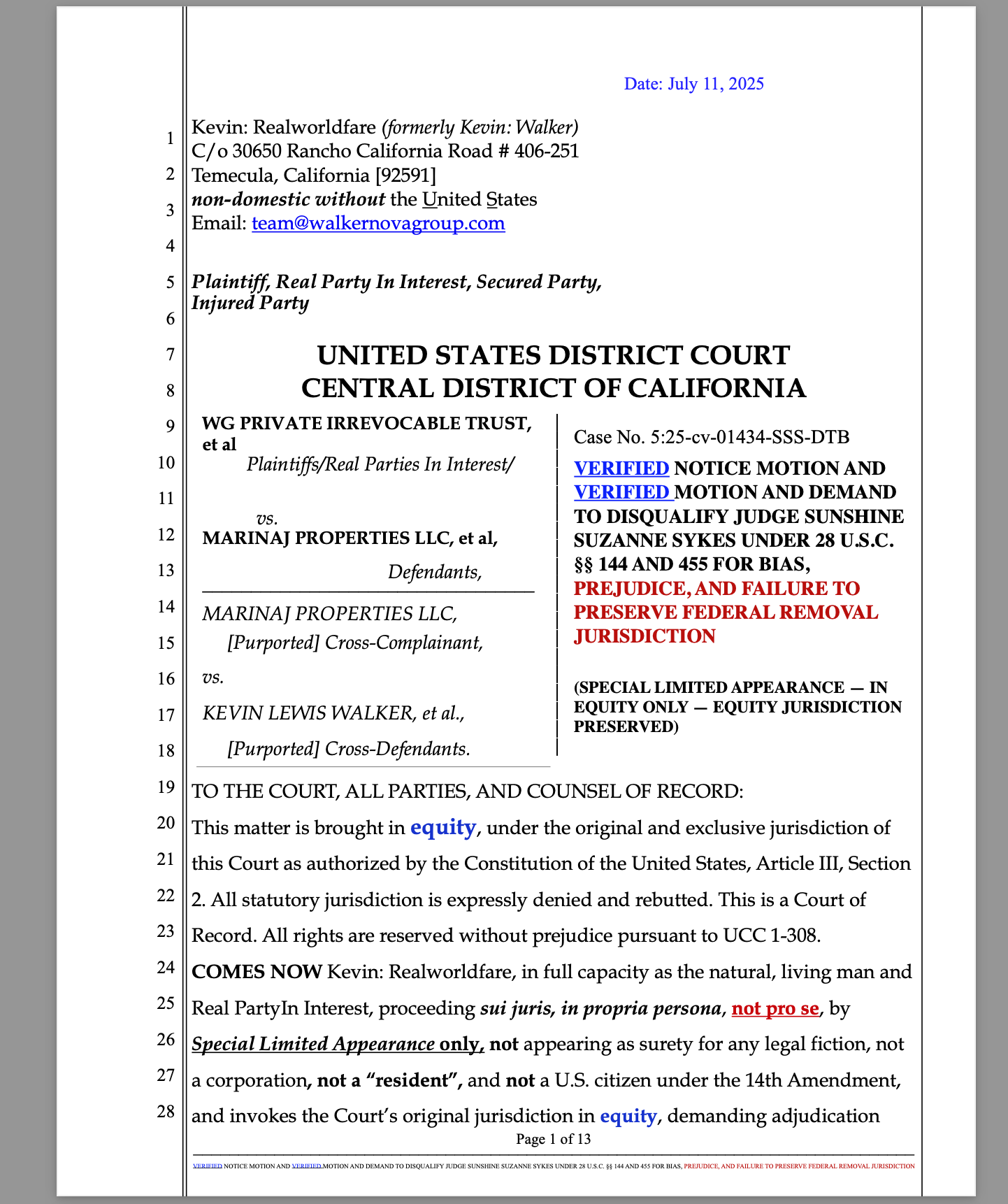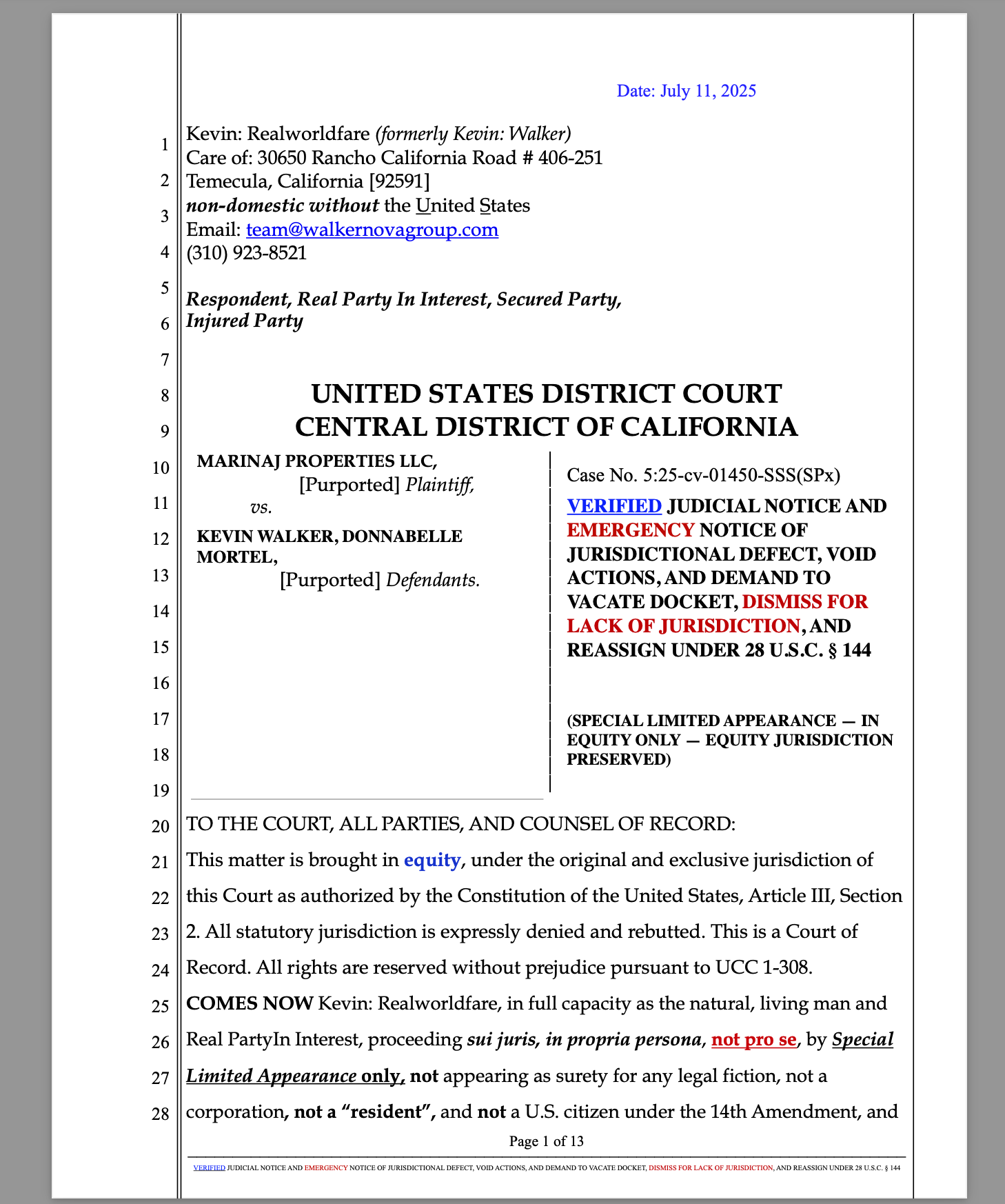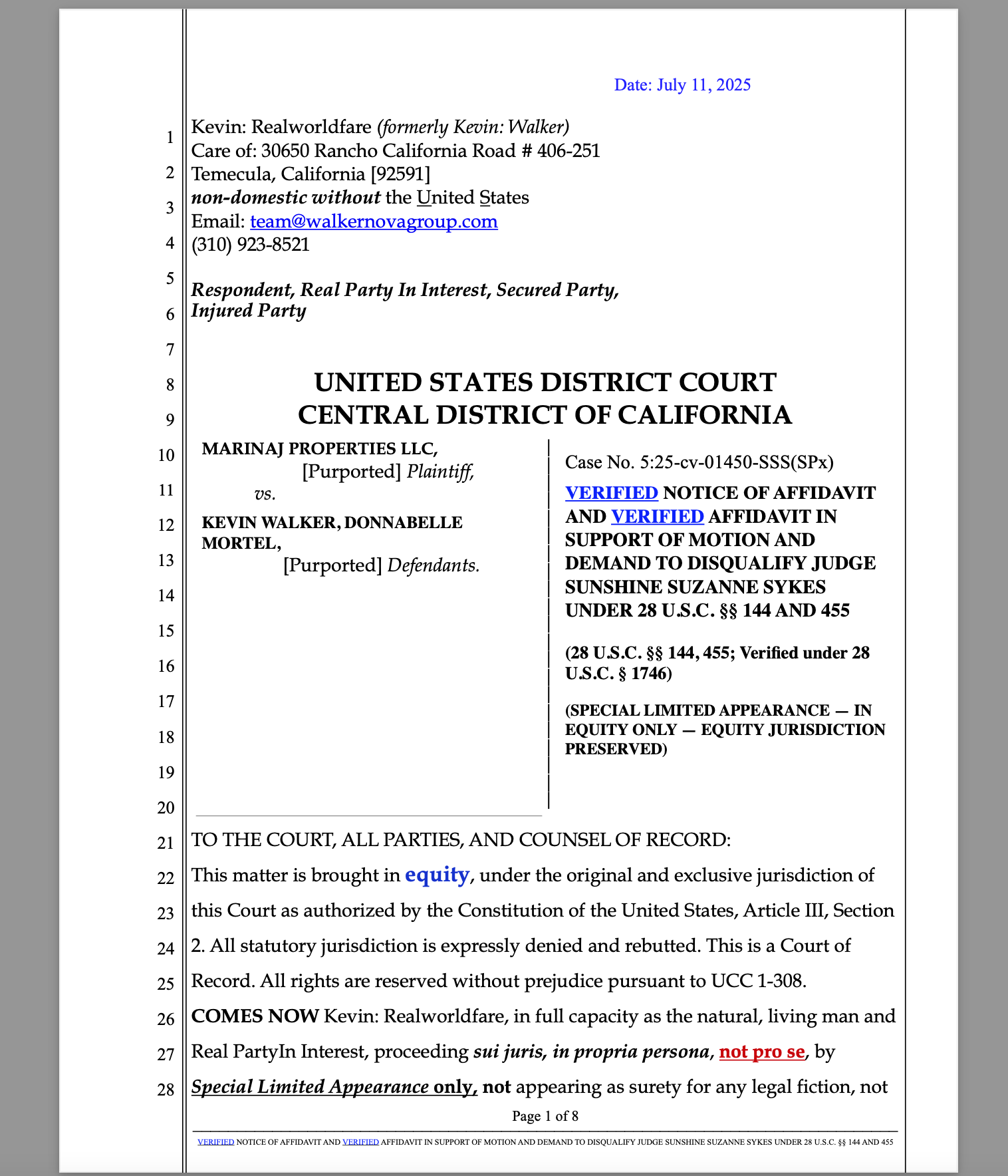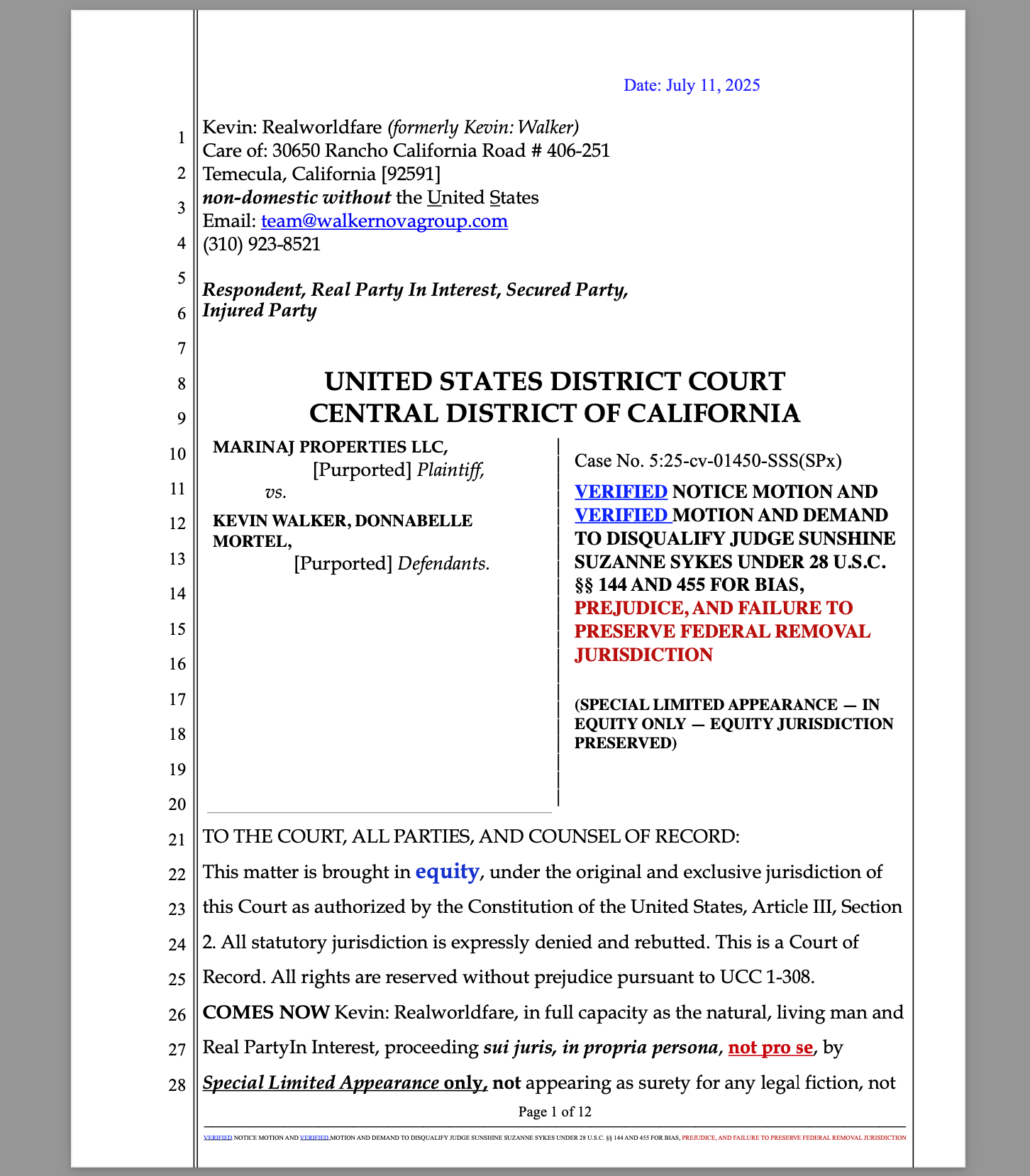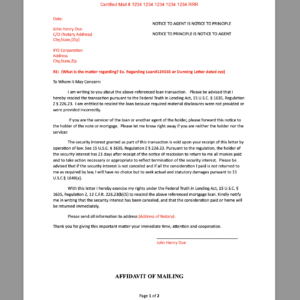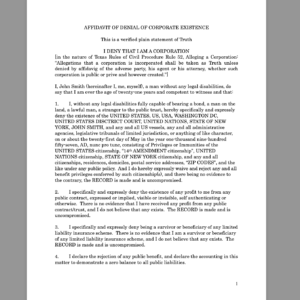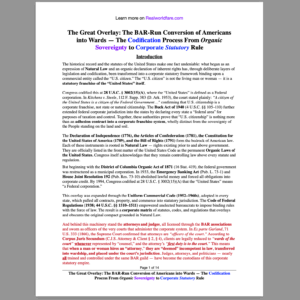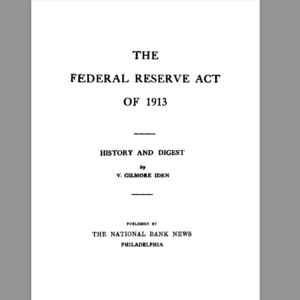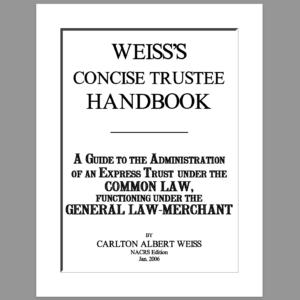RIVERSIDE, CALIFORNIA — July 11, 2025
Sunshine Suzanne Sykes, a sitting judge of the U.S. District Court for the Central District of California, has been recused by operation of law from at least three federal civil rights cases upon the lawful filing of verified motions and affidavits pursuant to 28 U.S.C. §§ 144 and 455. Despite this mandatory disqualification, Sykes continues to act without jurisdiction, in what amounts to ongoing obstruction of justice, fraud upon the court, and open rebellion against the Constitution of the United States.
⚖️ Mandatory Recusal Under Federal Law
On July 11, 2025, Kevin: Realworldfare, the living man and secured party creditor in multiple actions, filed Verified Motions and Affidavits seeking immediate disqualification of Judge Sykes based on a clear and documented record of bias, prejudice, procedural fraud, and deprivation of federal removal jurisdiction under 28 U.S.C. § 1446(d). These filings were legally sufficient under controlling case law, including:
-
Berger v. United States, 255 U.S. 22 (1921)
-
United States v. Sibla, 624 F.2d 864 (9th Cir. 1980)
-
In re Goodwin, 194 B.R. 214 (9th Cir. B.A.P. 1996)
The statute is not discretionary:
“The judge shall proceed no further.” — 28 U.S.C. § 144
🚨 Sykes Continues to Violate Federal Law
Despite being disqualified by law, Judge Sykes has:
-
Failed to refer the disqualification motion to a neutral judge, as required by statute.
-
Refused to vacate void docket activity occurring after recusal was triggered.
-
Continues to sit on dispositive motions and unrebutted affidavits that demand immediate dismissal and quiet title relief.
-
Entered no order staying proceedings or acknowledging the jurisdictional divestment.
This is not judicial discretion — this is judicial fraud, sabotage, and obstruction.
🧾 Affected Cases Under Her Control
Judge Sykes remains unlawfully involved in three major federal civil rights cases, all involving verified claims of estate theft, fraud, and violations of due process:
-
Marinaj Properties LLC v. Kevin Realworldfare et al (fraudulent substitution of parties)
Case No. 5:25-cv-01450
Nature of Suit: 440 Civil Rights – Other
Cause: 28 U.S.C. § 1441 — Civil Rights Removal
UD fraud, false substitution of party, simulated legal process — PACER LINK -
WG Private Irrevocable Trust et al v. Marinaj Properties LLC et al
Case No. 5:25-cv-01434
Nature of Suit: 440 Civil Rights – Other
Cause: 28 U.S.C. § 1441 — Civil Rights Removal
Quiet title; commercial discharge; estate seizure by fraud — PACER LINK -
Kevin Realworldfare v. Naji Doumit et al
Case No. 5:25-cv-01357
Nature of Suit: 440 Civil Rights – Other
Cause: 42 U.S.C. § 1983 — Civil Rights Act
42 USC 1983 civil rights, RICO, Quiet title, fraud under color of law, and more — PACER LINK
🧨 Constitutional and Criminal Implications
Judge Sykes’ continued actions constitute:
-
Fraud upon the court
-
Willful obstruction of federal removal
-
Treasonous war against the Constitution
-
Color of law deprivation of rights under 42 U.S.C. § 1983
-
Maladministration of estate property, liened trust assets, and private commercial paper
-
Simulated legal process in direct violation of verified affidavits, commercial instruments, and lawful tender
🔨 Imminent Consequences: Writs, Lawsuits, and Supreme Court Review
If Judge Sykes fails to immediately vacate all further action, the following remedies will be executed without delay:
-
Emergency Petition for Writ of Mandamus — Ninth Circuit
-
Civil Rights Action Under 42 U.S.C. § 1983 — Filed Against Sykes in Her Personal Capacity
-
Rule 20 Petition to the Supreme Court of the United States — Invoking Constitutional Supremacy and Emergency Intervention
-
Public Call for Federal Judicial Investigation — Referral for impeachment inquiry, obstruction charges, and disqualification
Controlling Legal Authority Mandating Immediate and Automatic Judicial Disqualification Under 28 U.S.C. § 144
The law is clear: once a proper and timely affidavit is filed alleging bias or prejudice under 28 U.S.C. § 144, the presiding judge is automatically disqualified by operation of law and may not proceed further in the matter. Judicial action beyond that point is void for want of jurisdiction.
⚖️ Binding U.S. Supreme Court and Ninth Circuit Case Law
1. Berger v. United States, 255 U.S. 22, 36 (1921)
“The affidavit is addressed to the judge, but the judge can only pass on its legal sufficiency, not on the truth of its statements. If it is sufficient, the judge must proceed no further, and another judge must be assigned to hear the matter.”
🔹 A judge must accept all facts in the affidavit as true and is automatically disqualified once the affidavit is filed.
2. United States v. Sibla, 624 F.2d 864, 867 (9th Cir. 1980)
“The factual allegations of the affidavit must be taken as true and the judge must recuse if the affidavit is legally sufficient.”
🔹 Recusal under § 144 is mandatory once a sufficient affidavit is filed — not discretionary.
3. In re Goodwin, 194 B.R. 214, 221 (9th Cir. B.A.P. 1996)
“Section 144 is self-enforcing. Once a party files a timely and sufficient affidavit, the judge has no further jurisdiction and must assign the matter to another judge.”
🔹 Any judicial act by a disqualified judge is void ab initio.
4. United States v. Ritter, 540 F.2d 459, 464 (10th Cir. 1976)
“Once a sufficient affidavit is filed, the disqualified judge loses jurisdiction immediately and cannot take any further action in the case.”
5. United States v. Balistrieri, 779 F.2d 1191, 1199 (7th Cir. 1985)
“Section 144 requires only that the affidavit state facts and the reason for the belief that bias or prejudice exists. The truth of the allegations is not for the court to evaluate.”
6. Schroeder v. McDonald, 55 F.3d 454, 460 n.10 (9th Cir. 1995)
“A party need not submit a notarized affidavit where the motion is verified under penalty of perjury pursuant to 28 U.S.C. § 1746.”
🔹 Affidavits do not require notarization; verification under penalty of perjury is legally sufficient.
7. Liteky v. United States, 510 U.S. 540, 551 (1994)
“Recusal is required where a judge displays such a high degree of favoritism or antagonism as to make fair judgment impossible.”
8. Caperton v. A.T. Massey Coal Co., 556 U.S. 868, 881–82 (2009)
“Due process requires disqualification in cases where the probability of actual bias on the part of the judge is too high to be constitutionally tolerable.”
🧾 Summary of Legal Principles
-
A sufficient affidavit under § 144 strips the judge of jurisdiction immediately.
-
The judge cannot evaluate the truth of the affidavit—only its facial sufficiency.
-
The matter must be reassigned to another judge.
-
Any actions taken by the disqualified judge are void ab initio.
-
Verification under 28 U.S.C. § 1746 is sufficient—no notarization required.
🛑 Conclusion: Sunshine Sykes Must Be Removed
This is no longer about judicial error — it is now about fraud, bad faith, and malicious intent to undermine federal civil rights, ignore verified commercial tenders, and steal private estate property under simulated legal authority.
Sunshine Suzanne Sykes is acting in treason, rebellion, and contempt of her oath.
The people will not tolerate judges who ignore federal mandates, silence truth, and protect fraudulent actors.
NEED HELP? Have a budget for your situation? Submit your case:
